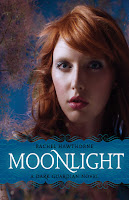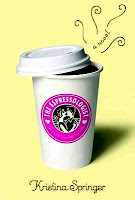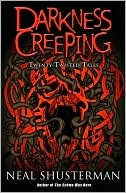 I was so impressed with Mark Fink's The Summer I Got a Life that I ordered his first book, Stepping Up without having read it and was absolutely delighted with it. Ernie and his best friend Mike go to summer camp every year, and this year, Mike chooses basketball camp. Ernie's okay with that until one of the other campers, Rick Craig, gives him a hard time about his game and about his stuttering, saddling him with the nickname "Choke". Mike excels in basketball and gets along with the other boys well, while Ernie struggles. I loved this paragraph (page 51): Life is not fair if an idiot like Craig can be so popular. I wonder what it's like to be the guy everyone respects and wants to hang with. Just once, I'd like to be that guy."
Ernie gets his chance after Mike and Rick make some bad decisions and Ernie saves them from a fire. Ernie rockets to popularity, but as with every element in this book, this rise is believable, and Ernie's reaction to it seems true-to-life. Once again, Mr. Fink nails the teen-age voice, describes the angst Ernie feels at a variety of situations with pitch-perfect detail, AND adds basketball plays to the mix. Exactly what I want.
Watch for an interview with Mark Fink next week!
I was so impressed with Mark Fink's The Summer I Got a Life that I ordered his first book, Stepping Up without having read it and was absolutely delighted with it. Ernie and his best friend Mike go to summer camp every year, and this year, Mike chooses basketball camp. Ernie's okay with that until one of the other campers, Rick Craig, gives him a hard time about his game and about his stuttering, saddling him with the nickname "Choke". Mike excels in basketball and gets along with the other boys well, while Ernie struggles. I loved this paragraph (page 51): Life is not fair if an idiot like Craig can be so popular. I wonder what it's like to be the guy everyone respects and wants to hang with. Just once, I'd like to be that guy."
Ernie gets his chance after Mike and Rick make some bad decisions and Ernie saves them from a fire. Ernie rockets to popularity, but as with every element in this book, this rise is believable, and Ernie's reaction to it seems true-to-life. Once again, Mr. Fink nails the teen-age voice, describes the angst Ernie feels at a variety of situations with pitch-perfect detail, AND adds basketball plays to the mix. Exactly what I want.
Watch for an interview with Mark Fink next week!
It's hard to go wrong with Mary Downing Hahn, and her latest, Closed for the Season, was excellent. I am a huge fan of storybook forest type amusement parks, but there are so few left, so it makes perfect sense that the Magic Forest has fallen into disrepair and is the site of a mystery for Logan, who moves to town, and his friend Arthur, who is very interested in the death of the former owner of Logan's house. Some say that Mrs. Donaldson died when she fell down the chairs, but Arthur believes she was murdered and somehow involved in the embezzlement that led to the financial demise of Magic Forest. When the boys poke around the attic, they find a letter that Mrs. Donaldson left for her daughter, and start to investigate. There are lots of suspenseful moments in this one, and the story is as darkly atmospheric as the cover.
 For some reason, I find books about India very interesting, and I am able to hand sell these to students, although they are not apt to pick them up independently. Kashmira's Sheth's Boys Without Names tells the story of Gopal, whose family loses their farm and goes to live in Mumbai with an uncle. Nothing goes smoothly-- Gopal's father disappears, the family is short of money, and then he gets kidnapped and works as a slave in a small workshop that makes picture frames. The other boys come from a variety of impoverished backgrounds, and each has a story. Like D'Adamo's Iqbal, I think this is a story that students in the U.S. need to read, so that they realize hoe good they have it. Sheth has not only done her research but does a wonderful job of portraying the ambitions and emotions of her characters.
For some reason, I find books about India very interesting, and I am able to hand sell these to students, although they are not apt to pick them up independently. Kashmira's Sheth's Boys Without Names tells the story of Gopal, whose family loses their farm and goes to live in Mumbai with an uncle. Nothing goes smoothly-- Gopal's father disappears, the family is short of money, and then he gets kidnapped and works as a slave in a small workshop that makes picture frames. The other boys come from a variety of impoverished backgrounds, and each has a story. Like D'Adamo's Iqbal, I think this is a story that students in the U.S. need to read, so that they realize hoe good they have it. Sheth has not only done her research but does a wonderful job of portraying the ambitions and emotions of her characters.While Walter Dean Myer's Lockdown will be hugely popular with my students who are oddly interested in drugs and juvenile delinquents, this book was not as riveting as I had hoped. Reese is in a detention facility because he stole prescription pads and sold them to a drug dealer, but he is intelligent and has behaved himself, so he is sent to work at a nursing home as part of a rehabilitation program. He cleans and helps patients, especially Mr. Hooft, a Dutch man who spent time in a children's detention camp during World War II. At first, Mr. Hooft distrusts Reese, but warms to him. Reese tries to keep himself out of trouble so that he can go home and help his younger sister go to college, but keeps making mistakes. I did appreciate the fact that none of the dialogue is in excessive street slang or dialect, but there are at least two instances of the f-bomb that are not really warranted. Myers is a very prolific writer, but it doesn't feel like his heart was in this one.










































































